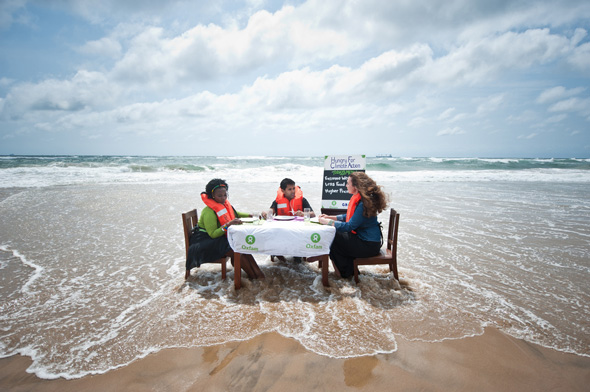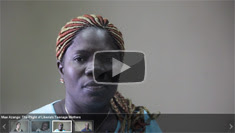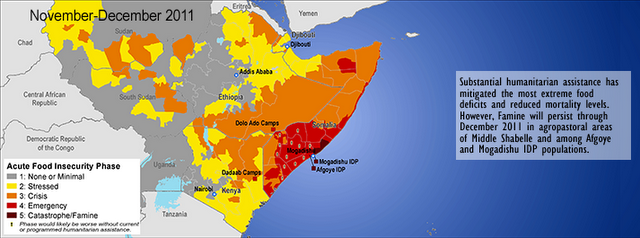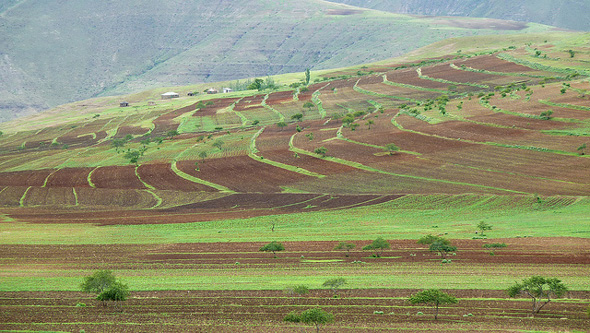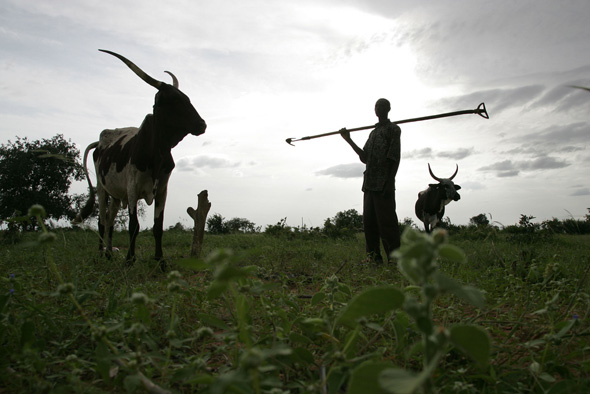-
Climate Diplomacy in Perspective
›December 20, 2011 // By Lukas RüttingerClimate policy on the international level often seems to be largely limited to negotiations within the United Nations Framework Convention on Climate Change (UNFCCC). However, in the shadow of these negotiations, a new approach merging climate and foreign policy is developing. Calling it “climate diplomacy,” proponents of this approach argue that tackling climate change is inherently a political struggle and one in which classic diplomatic instruments should play a role. This is especially true, since the challenges posed by climate change are so huge and the solutions so far reaching that the climate conversation also has to be a diplomatic one. Yet negotiations and treaties are just one instrument of foreign policy and they are only as successful and strong as the political foundation upon which they are built.
The German Federal Foreign Office, supported by adelphi, invited representatives from the European Union, the Organization for Security and Cooperation in Europe, and the United Nations, as well as over 30 countries for a two-day conference in Berlin this October, “Climate Diplomacy in Perspective – From Early Warning to Early Action,” to discuss what climate diplomacy looks like in practice, what its added value is, and what challenges it is best suited to address.
In working groups on water diplomacy, food security, and coastal stability, common themes and questions quickly emerged. In particular, the value and danger of securitizing the climate change discourse was a prominent issue.
On the one hand, the securitization of issues such as transnational water sharing can raise threat perception to a level that makes it very hard to tackle and may even foster conflict. On the other hand, participants noted that framing climate change as a security challenge might help to finally create the political leverage needed for far-reaching action.
Confronting Complexity
Another common theme was the complexity and linked nature of the climate challenges faced. Although covering different aspects, each working group quickly recognized systems with multiple feedback loops, such as the water-food-energy nexus. The same point was underlined in discussions around complex emergencies and crises, such as the 2010 floods in Pakistan.
However, the discussion did not stop at an analysis of challenges, the working groups also developed many suggestions of what climate diplomacy could and should look like.
One shared recommendation was that the complexity of and links between issues require sectoral policies and institutions to reach beyond their traditional, thematic, and even geographic focus. In regards to cross-border water cooperation, for example, this means that regional political institutions are often better suited than water institutions because of their broader mandate and focus. Where classic diplomacy and regional cooperation do not work, for example because national governments are blocking these efforts, participants proposed that informal diplomacy, track two initiatives, and cooperation on lower administrative levels such as municipalities can provide alternatives.
The complexity of the challenges is daunting but when asked to summarize why diplomats should tackle climate change, John Ashton, the special representative for climate change for the British Commonwealth Foreign Office, summed up his understanding in a simple but to-the-point answer: “Because it is our job.”
Lukas Rüttinger is a project manager for adelphi, mainly focusing on the fields of conflict analysis and peacebuilding as well as resources and governance.
Photo Credit: German Federal Foreign Office. -
From Dakar: Explaining Population Growth and Family Planning to Environmentalists
›December 19, 2011 // By Sandeep Bathala“There is a growing recognition that population is a key driver of environmental, development, governance, and security challenges; however, family planning is not a traditional tool, nor is it often considered an ‘appropriate’ one, for responding to food, water, climate, or conflict,” said Roger-Mark De Souza at a November 30 panel discussion at the 2011 International Conference on Family Planning in Dakar, Senegal. “This presents a challenge for us: How can we change perceptions of family planning so that it becomes part of the solution to wider problems, including natural resource scarcity, lack of economic development, gender inequity, and instability?”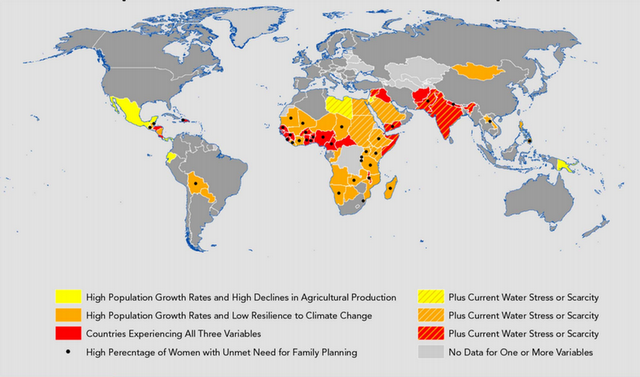
De Souza, vice president of research and director of the climate program at Population Action International (PAI), was joined by Sandeep Bathala, program associate with the Wilson Center’s Environmental Change and Security Program; Robert Engelman, president of Worldwatch Institute; and Daisy Magaña, fellow with the GoJoven Program, for a session on “Reaching Out at Rio: Explaining Population Growth and Family Planning to Environmentalists.”
Population Dynamics Part of Climate Vulnerability
“Advocates…need to communicate that empowering women to make their own reproductive choices will improve both their individual well-being and our collective environment,” said Engelman. According to research conducted on behalf of Americans for UNFPA, messages that focus on women – their health or empowerment – resonate well with American environmentalists, as they do with broader audiences.
PAI’s interactive mapping website shows that high levels of unmet need for family planning and rapid population growth rates are common in countries with low levels of resilience to climate change and high levels of projected decline in agricultural production, said De Souza. “Family planning services can be one element of a multi-pronged strategy to reduce especially women’s vulnerability to these interlocking vulnerabilities,” he said.
“Currently, population growth is viewed as a challenge to addressing climate change-related vulnerabilities, but family planning services are commonly left out of conversations about ways to reduce these vulnerabilities.” This is a lost opportunity, said De Souza: “We can integrate family planning into wider environmental, development, and peace-building efforts.”
At the recent UN Climate Change Conference in Durban, a side event on reproductive health and climate was well-attended. However, as panelist Esther Agbarakwe of the Africa Youth Initiative on Climate Change noted, population was not part of the conference‘s official discussion, due to lack of knowledge and fears of population control. PAI is currently working with UNFPA to produce a series of training modules on population and climate change that will help environmentalists, climate change activists, and researchers better understand and explore these connections.
Tapping the Youth Base
Bathala, formerly the Sierra Club’s Global Population and Environment Program director, discussed how the Sierra Club, one of the only major grassroots conservation organizations with a population program, uses youth outreach to raise awareness on the links between the environment, reproductive health, and women’s rights.
Because young people constitute over half of the world’s population, the Sierra Club focuses on empowering youth leaders to make the connection between environmental issues and sexual and reproductive health and rights. The Population and Environment Program reaches youth directly by organizing summits and multi-state campus tours featuring young people from around the world sharing compelling stories with their peers.
“The program provides youth and adult activists with materials, communication strategies, and leadership training,” Bathala said. “With these tools, the activists then educate their community members, campus, and decision-makers about the need for measures that increase access to family planning while addressing poverty, women’s empowerment, and environmental protection.”
In April, fellow panel member and Belize-native Daisy Magaña joined one of the Sierra Club’s U.S. tours to discuss the GoJoven program, which convenes and support youth reproductive health champions throughout Latin America. Through GoJoven, Magaña has worked to expand adolescent reproductive and sexual health choices, services, policies, and programs in Belize.
In a blog post, Magaña discussed how her message was simple: Don’t give up. “If you think being active on environmental and sexual rights issues is hard to do here, imagine doing it in a deeply conservative [Catholic] country like mine,” she told U.S. students.
Sierra Club also leads story tours to functioning population, health, and environment programs in the field, including a 2009 trip to Guatemala and Belize in conjunction with GoJoven. Through visits to 10 project sites, two U.S.-based youth advocates witnessed first-hand the challenges and opportunities associated with community-based sexual and reproductive health programs, significantly enhancing their ability to be pro-active messengers in their own communities. The tour helped the Sierra Club build an international network of young people committed to social and policy change in their countries.
Looking Forward: Finding Ways To Highlight Integration
While recognition of the connections between population growth and environmental impacts is growing, the experience of the panelists shows that it takes innovative methods to reach both the environmental and family planning communities. A similar panel later this winter at the Wilson Center will include representatives of Americans for UNFPA discussing their research on talking to environmentalists about reproductive health and population growth.
With the UN Conference on Sustainable Development (Rio+20) coming in June of next year, highlighting successful strategies is crucial in order to pave the way for better integration in the future.
Event ResourcesImage Credit: Roger-Mark De Souza/Population Action International. -
Ruth Greenspan Bell and Barry Blechman for Foreign Affairs
How Much Did the Climate Talks in Durban Accomplish?
›December 16, 2011 // By Wilson Center StaffThe original version of this article, by Ruth Greenspan Bell and Barry Blechman, appeared on Foreign Affairs.
The outcome of the recent Durban climate conference represents a victory, of sorts, for a particular vision of how the community of nations might eventually gain control over greenhouse gases. But that vision is flawed, perpetuating an approach that, after more than 20 years of negotiations, has not reversed warming trends. Of particular concern is the continued insistence on a comprehensive deal negotiated by all nations through a UN process. The degree to which the meme of a “legally-binding” agreement has dominated thinking is likewise troubling.
Our October article, “Beyond the Durban Climate Talks,” examined an alternative negotiating pathway – one based on the effective model of nuclear arms control. There, specific issues were opportunistically segmented for resolution. And, in some cases, negotiators achieved progress by working in alternative fora that were not wedded to the UN ground rules, especially the ones that give every country, no matter how small, a potential veto on the results. Unfortunately, the Durban result continues the well-trod UN pathway.
The meetings saw protracted debate about how precisely to characterize the “legal” and “binding” nature of a future agreement that might emerge in 2015 from yet another “new” round of negotiations. Indeed, the supposed distinction between “political” or “voluntary” and “legally binding” agreements has dominated United Nations Framework Convention on Climate Change negotiations for years. Yet such distinctions break down upon closer examination.
Continue reading on Foreign Affairs.
Ruth Greenspan Bell is public policy scholar at the Wilson Center.
Photo Credit: “Oxfam hungry for climate action at Durban Climate Conference,” courtesy of Oxfam International and Ainhoa Goma. -
Jake Naughton, Pulitzer Center for Crisis Reporting
Pulitzer Center Launches Collaborative Reporting Project on Reproductive Health
› The original version of this article, by Jake Naughton, appeared on the Pulitzer Center for Crisis Reporting blog.
The original version of this article, by Jake Naughton, appeared on the Pulitzer Center for Crisis Reporting blog.
The Pulitzer Center launched its collaborative reproductive health-reporting project at this year’s International Conference on Family Planning (ICFP) in Dakar, Senegal. The project brings together four journalists from Africa and four from the United States who will collaborate to enhance local and international reporting about reproductive health across the continent.
The African journalists are Mae Azango of Liberia, Estelle Ellis of South Africa, Sam Olukoya of Nigeria, and Ken Opala of Kenya. Their U.S. counterparts are Christian Science Monitor correspondent Jina Moore; New Yorker editorial staffer Alexis Okeowo; and the Pulitzer Center’s managing director Nathalie Applewhite and visual media coordinator Jake Naughton.
More than two thousand reproductive health professionals and hundreds of journalists from all over the world participated in the conference, which sought to shine a spotlight on the unmet need for family planning services worldwide, and to focus on integrating family planning into general health services.
Continue reading on the Pulitzer Center for Crisis Reporting blog.
Video Credit: “Meet the Journalists: Dakar,” courtesy of the Pulitzer Center. -
Watch: Dr. Vik Mohan on Integrating Family Planning and Conservation in Madagascar
›The integration of population, health, and environment programming “enables us to create synergies that mean we are more effective at achieving both health and conservation goals,” said Dr. Vik Mohan, director of sexual and reproductive health programming for Blue Ventures, in an interview with ECSP at the 2011 International Conference on Family Planning.
After Blue Ventures established their first clinic in 2007 in the village of Andavadoaka, on Madagascar’s southwest coast, “we felt immense pressure to scale up our intervention,” said Mohan. “We started with one clinic in one village, and now we have a multi-site service covering all 40 villages that we partner with for our community-based conservation work,” he said.
According to data compiled by Blue Ventures, the average total fertility rate in the region is 6.7 children per woman. The London-based eco-tourism-turned health and environment NGO offers a variety of family planning services to meet local demand, including mobile outreach clinics and community-based distribution of contraceptives. They also partner with Marie Stopes International to offer long-acting and permanent methods of contraception for those that want it.
“This Model Can Be Taken to Scale”
By integrating conservation and reproductive health messaging and service delivery, “we are getting greater buy-in from the community because they all see the added value of the breadth of things that we offer them,” Mohan said. “Men who came to hear about fisheries management get to hear about family planning technologies, practically for the first time in their lives.”
The fishermen are able to see the links between food security and population growth through their own experience, he added. “We believe very passionately this model can be taken to scale,” Mohan said. “This is something that could be easily replicated in other regions. Definitely in other coastal regions, but almost certainly in other remote areas – perhaps areas of high biodiversity where there are existing projects, perhaps conservation projects – but where there is an unmet need for healthcare and family planning in particular.”
“My advice to other organizations, whether you are doing healthcare or whether you are doing conservation, is just think holistically,” said Mohan. “If you are a conservation organization that recognizes that there is an unmet healthcare need for the communities that you work with, then…don’t be afraid to ask those questions, and don’t be afraid to build capacity to meet the need, if you find one. Or, don’t be afraid to partner with health NGOs to enable that need to be met.”
For more on Blue Ventures’ integrated efforts, see also ECSP FOCUS Issue 23, “To Live With the Sea: Reproductive Health Care and Marine Conservation in Madagascar,” co-authored by Vik Mohan. -
Famine and Food Insecurity in the Horn of Africa: A Man-Made Disaster?
›This year’s drought in the Horn of Africa has been the region’s worst in decades and has exploded into a humanitarian catastrophe affecting millions. In Somalia, where the drought is layered on top of two decades of conflict and an extremely weak state, the impact of the drought has been most damaging. Somalia is the only country in the region where the UN has declared famine zones. And, even though the UN recently upgraded three of Somalia’s six famine areas to “lesser emergencies,” four million Somalis – more than half the country’s population – remain in urgent need of food and general humanitarian aid.
The drought may have been what sparked the current crisis, but other, longer-term factors, like a sustained lack of agricultural development, extreme rural poverty, and changing weather patterns, not to mention Somalia’s lack of functioning government, set the stage.
A Long-Term Crisis in the Making
“Lack of rainfall over several seasons is the most immediate and most visible cause of the current humanitarian crisis in the Horn of Africa,” said Jim Hansen of the Consultative Group on International Agricultural Research (CGIAR) in a brief video produced this summer by the International Research Institute for Climate and Society at Columbia University (watch above). Much of the Horn’s population “depends on rain-fed agriculture and pastoralism for their livelihoods and sustenance,” said Hansen. Already “quite poor and…locked in poverty for quite a long time,” environmental and resource degradation, paired with rapid population growth, have compounded their vulnerability to extreme events, he said.
Throughout the region, resilience to crises like the current drought has been weakened by decades of poor agricultural planning, “driven more by shifts in ideology than any real evidence among some of the key international development organizations,” said Hansen. That poor planning has made communities more dependent on humanitarian aid when poor weather hits, which in turn forces aid groups to redirect resources away from longer-term development and towards short-term disaster relief instead, Hansen said.
While these problems exist across the Horn of Africa, Hansen points out that the crisis has been most damaging in Somalia, which he attributes to the country’s weak governance and to international aid groups’ limited ability to operate in the country.
“Northern Kenya, southern Ethiopia, and Somalia have similar severity of drought, but the humanitarian crisis is much more severe – the loss of livelihood and life is greater in Somalia largely because the government is weaker,” he said.
The Government’s Role
Owen Barder, a senior fellow at the Center for Global Development, draws a more direct line between governance and famine in the Horn. “In Somalia…there’s a complete breakdown of government, and the consequence is the famine that we’re seeing,” said Barder during a Center for Global Development podcast. The country has been without a functioning government since 1991, when civil war broke out. It has since become “the most food-insecure nation in the world” and, as described by Foreign Policy, “the international community’s longest-running failure.”
Barder raised two points about the government’s role in famine. One, that access to information – in this case an early warning system monitoring drought conditions – can minimize the humanitarian impact of any given natural disaster; and two, that a country’s government must be able to translate that information into action in order for it to actually make a difference.
Barder is not alone in emphasizing the state’s role as a driver of the famine. Edward Carr, a AAAS science fellow with USAID, wrote in July, when the UN first declared famine in Somalia, that attributing the famine solely to drought is “a horrible abdication of responsibility for the human causes of this tragedy.”
Charles Kenny, also a senior fellow at the Center for Global Development, went even further on Foreign Policy, arguing that famine, or “mass starvation as an intentional act of governance,” should be categorized as a crime and prosecutable at the International Criminal Court.
Al Shabab and the Months Ahead
As of late November, the United Nations estimated that tens of thousands had died in Somalia alone since drought began this spring. Though USAID’s Famine Early Warning Systems Network (FEWSNET) reports that famine has now subsided in three of the six southern regions it initially struck, a quarter of a million Somalis remain at risk of “imminent starvation,” according to the UN.
According to FEWSNET, famine should not reappear in the foreseeable future, assuming aid groups can maintain current distribution levels – a key caveat. Ten days after FEWSNET issued its analysis, however, Al Shabab, the Al Qaeda-linked militant organization that controls much of southern Somalia, banned 16 aid groups, including UNICEF and the World Health Organization, from operating in the areas under its control. UNICEF spokesman Jaya Murthy told the BBC that the move would put “about 160,000 severely malnourished children…at imminent risk of death.”
Fighting in southern Somalia between Al Shabab and Kenyan and Ethiopian forces is adding another layer to the country’s humanitarian crisis. The UN Office of the High Commissioner for Refugees reported that, as of late November, the fighting had become the primary driver of internal displacement, replacing drought and famine as the key drivers during the first three quarters of the year. The UNHCR estimated that, between the drought and the conflict, 1.46 million Somalis have been displaced.
Meanwhile, the rainy season is picking up, and although that’s good news for farmers and pastoralists, it also means that Somalis will be vulnerable to diseases like measles, typhoid, and cholera, which can spread quickly through overcrowded, under-supplied IDP camps. Somalis still living under Al Shabab’s control are prohibited from getting vaccinations, amplifying their vulnerability to disease in the coming months.
These latest developments offer strong evidence that policy decisions can exacerbate the human toll of natural disasters. From Barder’s perspective, that is reason for optimism. “We have the information, we have the capacity to prevent it from happening,” he said.
For more on Somalia’s underlying demographic issues, see Elizabeth Leahy Madsen’s post “In Somalia, Beyond the Immediate Crises, Demography Reveals a Long-Term Challenge.”
Sources: AlertNet, Associated Press, BBC, Famine Early Warning Systems Network, Foreign Policy, Huffington Post, The New York Times, UNHCR, UN News Centre, Voice of America.
Video Credit: “Jim Hansen on Food Security in East Africa,” courtesy of the International Research Institute for Climate and Society on vimeo; image credit: FEWSNET/USAID. -
Can “Climate-Smart Agriculture” Help Feed Africa’s Growing Population?
›December 13, 2011 // By Brenda ZuluFood production needs to increase 70 percent by 2050 to meet the demands of a growing world population, said former UN Secretary-General Kofi Annan in a keynote address on “climate-smart agriculture” at a COP-17 event hosted by the World Bank and African Union. Annan, who is now chairman of the Alliance for a Green Revolution in Africa (AGRA), said this was a particular concern in Africa, where four out of five citizens are dependent on agriculture for their livelihoods.
One in seven people in the world do not have enough food to eat, Annan said, and climate change is expected to make this challenge more difficult to overcome. Climate-smart agriculture includes a wide variety of techniques that help increase the resilience of communities and protect them from extreme weather events, such as terracing to prevent soil erosion, improving weather forecasting, managing water runoff, and developing irrigation systems.
“Climate change affects us by undermining our resource base through water and soil degradation,” said Prime Minister of Ethiopia Meles Zenawi at the event. “There is need to protect the resources and to rehabilitate green areas of our land.” He said that since 70 percent of Africans are small-scale farmers and that most of the poor in Africa were farmers, there is no better way to fight poverty on the continent than through agriculture.
South African President Jacob Zuma said at the event that given that the UN projects a population of more than nine billion people in the world by 2050, agriculture should be a priority as it is more vulnerable to climate change than any other sector.
“Climate-smart agriculture includes proven practical techniques such as mulching, intercropping, conservation agriculture, integrated crop management and agro forestry, improved grazing, and innovative better weather management,” he said, all of which have the potential to help increase crop yields.
Mary Robinson, chair of the Global Leaders Council for Reproductive Health, said there could be no smart agriculture without integrating women’s issues, because climate change affects women disproportionately. “Women make the connection between climate-smart agriculture, food security, and gender,” she said.
“Our ability to feed the growing population under climate variability and change will require new expertise and harmonized efforts,” said Robinson.
Annan agreed, saying African women should be fully involved in early action that can support technical assistance, such as screening agriculture plans to ensure they are “climate smart” as well as integrating climate resilience and mitigation into ongoing poverty-reduction programs and testing new approaches.
But according to Brylyne Chitsunge, a farmer from Pretoria speaking on the panel, things will need to change considerably from the status quo. “The small-scale farmer remains very much marginalized in institutions,” she said. “They exist on paper but they really don’t exist.”
Brenda Zulu is a member of Women’s Edition for Population Reference Bureau and a freelance writer based in Zambia. Her reporting from the COP-17 meeting in Durban (see the “From Durban” series on New Security Beat) is part of a joint effort by the Aspen Institute, Population Action International, and the Wilson Center.
Sources: World Bank, World Food Programme.
Photo Credit: “Cultivated hillsides,” courtesy of flickr user coda (Damien du Toit). -
Climate Change, Uncertainty, and Conflict in the Niger River Basin
›New research on the Niger River Basin finds that the effects of climate change in the region are pervasive and that “latent conflict” between groups – disagreements and disputes over damage to farmland and restricted access to water, but not physical violence – is common.
“You’ve got vulnerable people, vulnerable households, vulnerable communities living within…fragile systems – governance systems [and] environmental systems,” said Phil Vernon, International Alert’s director of programs for Africa and peacebuilding issues, at “Climate Change, Water, and Conflict in the Niger River Basin,” an event hosted by the Wilson Center on November 17. [Video Below]
Together with his colleagues Lulsegged Abebe and Marisa Goulden of the University of Anglia, Vernon examined how communities in Mali, Nigeria, and Niger have been impacted by climate change, how they have adapted to those impacts, and whether these changes spurred conflict.
Competition Over Dwindling Resources
Climate change destabilizes communities by adding uncertainty and stress, Vernon said, and when a community is already vulnerable, the impacts of those uncertainties and stresses are amplified and the potential for conflict is greater. In every community examined in the study, climate-induced vulnerability led to some kind of conflict. More often than not, however, that conflict took the form of disagreements, or “latent conflict,” rather than violent conflict – a reason for optimism in the face of dire predictions that an era of climate wars is upon us.
Throughout the basin, river flows and rainfall have been decreasing since the 1970s, said Goulden, creating tension between two of the major communities living in the basin – farmers and pastoralists. Pastoralists are forced to travel farther to bring their herds to water, while farmers are expanding their cropland to feed growing populations, reducing the pathways available to herders and their livestock.
Unfortunately, poor policy decisions have made tensions worse in some places. In Lokoja, Nigeria, for example, the government began dredging the Niger River in 2009 to improve commercial shipping. Officials said the dredging would reduce flooding, but in 2010, farmers suffered immensely from floods. The government’s false promises increased the farmers’ vulnerability, said Goulden, because, expecting to be protected from flooding, they were not adequately prepared, making the damage worse.
As a result, farmers are now building homes and developing cropland further away from the river, reducing land available to pastoralists and increasing the potential for conflict between the two communities.
Increased Resilience Is a “No-Brainer”
Climate in the Niger River Basin is marked by a high degree of variability – rainfall, river flows, and temperature already fluctuate a great deal and could become even more variable in the future, said Goulden.
That uncertainty has important implications for how people think about responding to climate change, said Abebe. “Development and adaptation policies must be flexible enough to cope with extreme variability both in the wetter and the dry conditions in the Niger River Basin,” he said.
Boosting resilience will be key to ensuring that vulnerable communities have the flexibility they need to respond to future crises, Vernon said.
“If the interaction of stress and vulnerability is the problem…it’s somewhat of a no-brainer that increased resilience is part of the answer,” said Vernon. And decisions on how to increase resilience “should be made at the lowest appropriate level…from high policy down to household and individual decisions.”
Different People, Different Levels of Resilience
Vernon’s emphasis on making decisions at the “lowest appropriate level” reflects the reality that various communities – and individual community members – experience climate change in different ways. Fostering adaptation strategies that take these variations into consideration will be an essential strategy for avoiding climate-driven conflict in the future.
In Mali, the Niger River flooded downstream of the Selingué Dam in 2001 and 2010, and in each case, researchers found divergent responses to the crises.
In the lead-up to the 2001 flood, dam operators had been intentionally keeping reservoir levels high in anticipation of increased demand for hydroelectric power during an upcoming soccer championship match. When heavy rains hit the area, though, the operators were forced to release huge amounts of water over a short period of time, causing massive flooding downstream.
In the flood’s aftermath, downstream farmers were able to successfully sue the power company for their losses, but downstream pastoralists had no comparable option. The pastoralists were therefore more vulnerable to the flood’s long-term impacts.
Responses differed within communities as well, often breaking down along gender lines. In 2010, when floods hit Mali again, men “were trying to help people move away from the flood water, and then afterward with rebuilding of homes,” said Goulden, “whilst women are concerned with finding shelter, cooking, and caring for the sick, elderly, and children.”
No “Massive Risk of Violence” in the Near Future
Policymakers are left with an urgent crisis – climate change – and a solution that is inherently time-intensive: building resilience in vulnerable communities down to the individual level, said Vernon.
“There is a risk of undermining the elements of resilience which exist already in responding too rapidly and too urgently based on the anxieties we have to the problem of climate change and insecurity,” he cautioned.
Fortunately, although the threat of climate change is urgent, Vernon said that the risk of that threat spilling over into violent conflict is still a long way off. “I think policymakers have got to be thinking about where might this lead,” he said, “but at the moment, in terms of this research, there was no evidence that there’s a massive risk of violence happening any time soon.”
Event Resources
Sources: AlertNet, BBC, International Alert.
Photo Credit: “Cattle manure millet field in Niger,” courtesy of flickr user ILRI (International Livestock Research Institute).
 A Publication of the Stimson Center.
A Publication of the Stimson Center.


